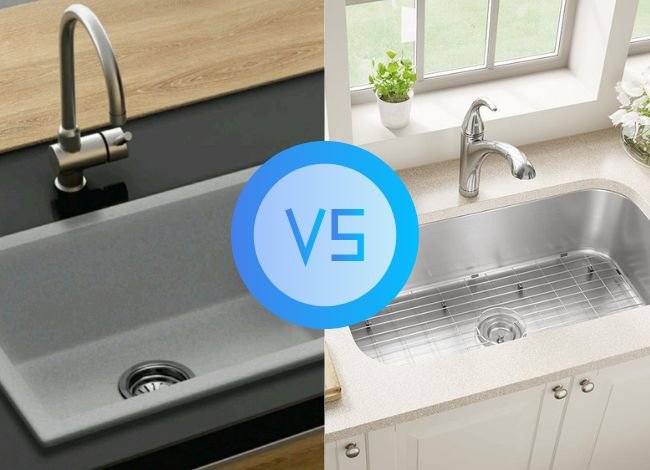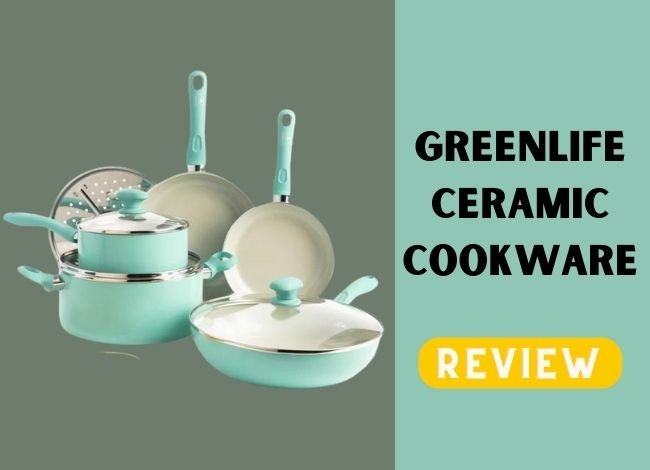Last Updated on February 7, 2024
Granite Kitchen Sinks
Granite kitchen sinks are increasingly popular in modern home designs, offering a combination of durability and aesthetic appeal. These sinks are typically made from a blend of granite stone dust and acrylic resins, which results in a robust surface resistant to scratches, chips, and heat. The natural look of granite provides a unique appearance to each sink, with a variety of colors and patterns available to complement different kitchen styles.
One of the primary benefits of granite kitchen sinks is their durability. They are designed to withstand the rigors of daily kitchen use, being resistant to heat, scratches, and stains. This makes them an excellent choice for busy kitchens. Additionally, granite sinks are non-porous, meaning they don’t absorb liquids, which helps prevent staining and maintains hygiene.
However, despite their strength, these sinks require some maintenance to keep them looking their best. Regular cleaning with non-abrasive cleaners is recommended. It’s important to avoid harsh chemicals that can damage the resin finish. With proper care, a granite kitchen sink can be a beautiful and long-lasting addition to any kitchen.
Pros and Cons of Granite Kitchen Sinks
Pros:
- Durability: Granite sinks are incredibly durable, resistant to scratches, chips, and heat. This makes them ideal for high-traffic kitchens.
- Aesthetic Appeal: With their natural stone appearance, granite sinks add a luxurious touch to any kitchen décor. They come in various colors and patterns, allowing for customization.
- Hygiene: Being non-porous, granite sinks don’t absorb liquids, preventing bacterial growth and making them hygienic.
Cons:
- Cost: Granite sinks can be more expensive than other types. The cost may be a consideration for those on a tight budget.
- Weight: These sinks are heavy, requiring strong cabinetry for support. This might involve additional installation costs.
- Maintenance: Regular maintenance is required to prevent the build-up of lime and other substances. Harsh chemicals should be avoided as they can damage the sink.
How to Take Care of Granite Composite Sinks
Maintaining a granite composite sink is essential to ensure its longevity and appearance. These sinks are known for their durability, but proper care is vital to prevent potential damage and keep them looking new. Here are some tips on how to take care of your granite composite sink:
- Regular Cleaning: Daily cleaning is crucial. Use warm water, a soft cloth, and a mild detergent. Avoid abrasive cleaners and sponges, which can scratch the surface.
- Dealing with Stains and Discoloration: A mixture of baking soda and water can be used for tough stains. Apply the paste to the stain, let it sit for a few minutes, and then gently scrub it away. Avoid using bleach or ammonia-based cleaners, as these can damage the sink’s surface.
- Preventing Water Spots and Mineral Deposits: Rinse the sink thoroughly and wipe it dry after each use. This prevents water spots and mineral deposits from hard water. If deposits do form, white vinegar can be used to dissolve them gently.
- Avoiding Extreme Heat: Although granite composite sinks are heat resistant, it’s advisable to avoid exposing them to extreme heat, like hot pans, as this can cause damage over time.
- Preventing Scratches: While these sinks are scratch-resistant, it’s wise to avoid dropping sharp or heavy objects into them. Using a sink mat can provide additional protection.
Stainless Steel Sinks
Stainless steel sinks have become a staple in modern kitchens and bathrooms, offering a sleek, contemporary look that complements a wide range of design aesthetics. Their popularity stems from the material’s inherent strength and durability. Stainless steel is known for its resistance to heat, stains, and corrosion, making it an ideal choice for the kitchen environment where it may be exposed to a variety of substances and temperatures. Furthermore, these sinks are often favored for their ease of maintenance. Unlike some other materials, stainless steel does not require special cleaners and is less prone to chipping or cracking. However, it’s not without its drawbacks. Over time, stainless steel can show water spots or scratches, and cheaper models might dent more easily. This blend of practicality with a few considerations to keep in mind makes stainless steel sinks a versatile and popular option for many homeowners.
Pros and Cons of Stainless Steel Sinks
Pros:
- Durability: Stainless steel is incredibly durable and resistant to heat, stains, and rust, making it a long-lasting option for any kitchen.
- Easy Maintenance: These sinks are easy to clean and maintain. They don’t require any special cleaners and are resistant to most stains and scratches.
- Aesthetic Appeal: Stainless steel sinks offer a sleek, modern look that fits well in many kitchen designs. They can add a touch of sophistication and professional aesthetic to a space.
Cons:
- Water Spots and Scratches: Despite their durability, stainless steel sinks can show water spots and may scratch over time, especially if abrasive cleaners are used.
- Noise: These sinks can be noisier than other materials. Cheaper models, in particular, may produce a tinny sound when water hits the basin.
- Variability in Quality: The quality of stainless steel sinks can vary greatly. Lower quality sinks might dent more easily and may not offer the same level of rust resistance.
How to Take Care of a Stainless-Steel Sink
Maintaining a stainless-steel sink is key to ensuring its longevity and keeping it looking its best. Regular cleaning is important; however, using the right techniques and products is crucial. For daily cleaning, warm soapy water and a soft cloth or sponge are usually sufficient. It’s important to avoid abrasive cleaners or scrubbers that can scratch the surface. After washing, rinsing the sink thoroughly and wiping it dry can prevent water spots and mineral deposits from forming.
A mixture of baking soda and water can be used for tougher stains or to restore shine. This gentle scrub can help remove stains without damaging the sink’s surface. Additionally, a vinegar and water solution can help remove hard water spots. It’s also important to avoid leaving acidic foods or harsh chemicals in the sink for extended periods as they can cause discoloration or damage to the surface.
With proper care and maintenance, a stainless-steel sink can remain a functional and attractive feature in your home for many years.
Comparison Table: Granite Sink vs. Stainless Steel Sink
| Feature | Granite Sink | Stainless Steel Sink |
|---|---|---|
| Appearance | Rich, elegant look with various colors | Sleek, modern, industrial look |
| Durability | Highly durable, resistant to scratches | Durable, but can scratch or dent |
| Heat Resistance | Excellent heat resistance | Good heat resistance |
| Stain Resistance | Resists stains well with proper sealing | Less resistant to staining |
| Maintenance | Requires resealing; easier to clean | Requires regular cleaning to avoid spots |
| Price | Generally more expensive | More budget-friendly |
| Noise | Quieter due to thicker construction | It can be noisy with heavy use |
| Weight | Heavier, requires sturdy support | Lighter, easier to install |
| Repairability | Difficult to repair if damaged | Easier to repair or replace |
| Environmental Impact | Natural material, but mining has an impact | Recyclable, but production energy-intensive |
Which Type of Kitchen Sink Should I Buy?
When deciding between a granite sink and a stainless steel sink for your kitchen, several factors come into play. Granite sinks, known for their durability and aesthetic appeal, offer a luxurious look that can complement various kitchen designs. Made from a blend of granite stone dust and acrylic resins, they are resistant to scratches, chips, and heat, making them a long-lasting option. The non-porous surface prevents bacteria growth, ensuring a hygienic environment for food preparation. However, granite sinks can be more expensive and may require regular sealing to maintain their appearance.
On the other hand, stainless steel sinks are a popular choice for their practicality and versatility. They are typically more affordable than granite sinks and are known for their durability. Stainless steel is resistant to heat and stains, though it can be prone to scratches. These sinks are also lightweight, making them easier to install. The reflective surface of stainless steel can add a modern touch to a kitchen and complement many appliances and fixtures. However, they can be noisier than granite sinks and might require more frequent cleaning to avoid water spots.
Ultimately, choosing between a granite sink and a stainless steel sink depends on your budget, style preferences, and maintenance willingness. Both offer unique advantages and can be excellent additions to any kitchen.
Conclusion
In conclusion, granite and stainless steel sinks have their own benefits and drawbacks catering to different needs and preferences. Granite sinks offer a blend of luxury and durability, ideal for those who prioritize style and are willing to invest in maintenance. They enhance the overall aesthetic of the kitchen while offering robust functionality. Stainless steel sinks, conversely, are practical, cost-effective, and versatile, fitting well in many kitchen styles, especially for those who prefer a contemporary look.
Your final decision should weigh factors like budget, kitchen design, maintenance level, and personal preference. It’s also worth considering the long-term implications of your choice, as a kitchen sink is a significant component of your daily kitchen use and overall home value. Whichever option you choose, ensure it aligns with your kitchen’s functionality and aesthetic needs, balancing style, durability, and practicality.
Frequently Asked Questions
Question: Which is more durable, a granite or stainless steel sink?
Answer: Granite sinks are highly durable and resistant to heat, scratches, and stains. Stainless steel is also durable but can scratch and dent more easily.
Question: Are granite sinks harder to maintain than stainless steel sinks?
Answer: Granite sinks require regular sealing to prevent staining and may need special cleaners. Stainless steel sinks are easier to maintain but show water spots and fingerprints more readily.
Question: Can granite sinks crack or chip?
Answer: While granite sinks are very sturdy, they can chip or crack with severe impact, unlike stainless steel sinks, which are more forgiving of impacts.
Question: Do stainless steel sinks rust or corrode over time?
Answer: High-quality stainless steel sinks are rust and corrosion-resistant, but lower quality ones or those exposed to harsh chemicals can develop rust or corrosion.
Question: Which sink type is better for noise reduction?
Answer: Stainless steel sinks can be noisier, but many come with sound-dampening pads. Granite sinks naturally absorb noise better.
Question: How do the costs of granite and stainless steel sinks compare?
Answer: Granite sinks are generally more expensive than stainless steel sinks due to the materials and manufacturing process involved.
Question: Are there environmental considerations in choosing between granite and stainless steel sinks?
Answer: Stainless steel is often recyclable, making it an eco-friendly choice. Granite sinks have a longer lifespan, reducing replacement frequency.
Question: Which type of sink offers more design options?
Answer: Granite sinks come in a wider range of colors and finishes, offering more design flexibility than stainless steel sinks.
Question: Can the weight of a granite sink be a problem during installation?
Answer: Granite sinks are heavier than stainless steel, potentially requiring additional support during installation.
Question: How does the heat resistance of granite compare to stainless steel?
Answer: Granite sinks offer excellent heat resistance, often better than stainless steel, making them ideal for handling hot pots and pans.
Question: Are there any health concerns associated with either type of sink?
Answer: Both granite and stainless steel sinks are generally safe, but it’s essential to ensure that granite sinks are properly sealed to prevent bacterial growth in any pores.




